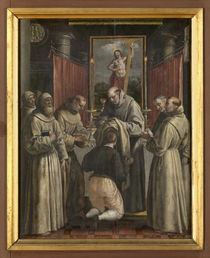The Catholic Defender: Saint Cyprian
- Donald Hartley

- Sep 11
- 3 min read
Updated: Sep 12
Deepertruth with special permission and aid with Franiciscan Media, a great team for the Lord

Cyprian of Antioch was a pagan sorcerer who converted toJesus Christ and His Holy Catholic Church.
In about 620 AD, a hermit named Cyprien settled in a cave that overlooked the Dordogne valley. Others gathered around him and a monastic community grew up. Barbarian invasions in the mid-9th century forced the monks to build defensive ramparts, one of which is the belltower-keep that survives today.
Latin in full Thascius Caecilius Cyprianus, (born 200 ce, Carthage—died September 14, 258, Carthage; Western and Eastern feast day September 16; Anglican feast day September 26), early Christian theologian and bishop of Carthage who led the Christians of North Africa during a period of persecution from Rome.
Highly educated and a famous orator, he became a Christian as an adult. He distributed his goods to the poor, and amazed his fellow citizens by making a vow of chastity before his baptism. Within two years he had been ordained a priest and was chosen, against his will, as Bishop of Carthage.
He converted to Christianity c. 246 and within two years was elected bishop of Carthage. In 250 he went into hiding to escape the Decian persecution, when many Christians apostatized.
Cyprian is important in the development of Christian thought and practice in the third century, especially in northern Africa.
Cyprian teaches how God is able to free us from even the powerful of sinful habits. He can give us freedom over addiction, strength over weakness, and the joy of the saints in place of the sorrow of sinners.
Highly educated and a famous orator, he became a Christian as an adult. He distributed his goods to the poor, and amazed his fellow citizens by making a vow of chastity before his baptism. Within two years he had been ordained a priest and was chosen, against his will, as Bishop of Carthage.
A controversial figure during his lifetime, his strong pastoral skills, firm conduct during the Novatianist heresy and outbreak of the Plague of Cyprian (named after him due to his description of it), and eventual martyrdom at Carthage established his reputation and proved his sanctity in the eyes of the Church.
Cyprian complained that the peace the Church had enjoyed had weakened the spirit of many Christians and had opened the door to converts who did not have the true spirit of faith. When the Decian persecution began, many Christians easily abandoned the Church. It was their reinstatement that caused the great controversies of the third century, and helped the Church progress in its understanding of the Sacrament of Penance.
Novatus, a priest who had opposed Cyprian’s election, set himself up in Cyprian’s absence (he had fled to a hiding place from which to direct the Church—bringing criticism on himself) and received back all apostates without imposing any canonical penance. Ultimately he was condemned. Cyprian held a middle course, holding that those who had actually sacrificed to idols could receive Communion only at death, whereas those who had only bought certificates saying they had sacrificed could be admitted after a more or less lengthy period of penance. Even this was relaxed during a new persecution.
During a plague in Carthage, Cyprian urged Christians to help everyone, including their enemies and persecutors.
A friend of Pope Cornelius, Cyprian opposed the following pope, Stephen. He and the other African bishops would not recognize the validity of baptism conferred by heretics and schismatics. This was not the universal view of the Church, but Cyprian was not intimidated even by Stephen’s threat of excommunication.
He was exiled by the emperor and then recalled for trial. He refused to leave the city, insisting that his people should have the witness of his martyrdom.
Cyprian was a mixture of kindness and courage, vigor and steadiness. He was cheerful and serious, so that people did not know whether to love or respect him more. He waxed warm during the baptismal controversy; his feelings must have concerned him, for it was at this time that he wrote his treatise on patience. Saint Augustine remarks that Cyprian atoned for his anger by his glorious martyrdom. His liturgical feast is celebrated on September 16.
Our Christian values of Faith, Hope and Love underpin our ethos and inform the culture of the school. The core values Respect, Integrity, Compassion and Accountability (RICA) drive daily conversations between teacher and student, colleagues, and at the peer to peer level.
The controversies about Baptism and Penance in the third century remind us that the early Church had no ready-made solutions from the Holy Spirit. The leaders and members of the Church of that day had to move painfully through the best series of judgments they could make in an attempt to follow the entire teaching of Christ and not be diverted by exaggerations to right or left.





















Comments